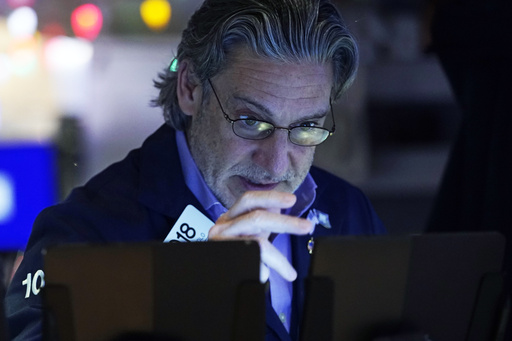
NEW YORK — U.S. stock markets experienced a significant upward movement on Friday, recovering some of the losses incurred during one of their roughest weeks of the year.
The S&P 500 index surged 1.6%, poised to mark its best performance in a span of six weeks. The Dow Jones Industrial Average also saw a notable increase, gaining 691 points, or 1.6%, as of 2:42 p.m. Eastern time, while the Nasdaq composite climbed by 1.7%.
A key factor in this market rebound was Eli Lilly, which saw its stock rise by 1.4%. The uptick was attributed to a recent announcement from rival Novo Nordisk concerning a potential weight-loss treatment. Analysts suggested that Novo Nordisk’s update did not meet expectations, potentially benefiting Eli Lilly’s Zepbound, a medication aimed at treating obesity.
Driving much of the market’s growth was Nvidia, which enjoyed a rise alongside other stocks after reports indicated that inflation—tracked by a favored metric of the Federal Reserve—was slightly lower than anticipated for the previous month. This news was received positively, especially following recent thoughts suggesting that bringing inflation down to the Fed’s 2% goal from a high of over 9% may pose significant challenges.
The concern surrounding inflation was a topic mentioned by Federal Reserve Chair Jerome Powell earlier this week, suggesting the possibility of fewer interest rate cuts next year than previously projected. This cautionary statement stirred uncertainty in the stock market, which had previously soared to record levels, fueled by the belief that the Fed would implement a series of rate cuts in 2025. Current trader expectations now reflect a high likelihood of only one or two cuts, or potentially none at all.
According to Brian Jacobsen, chief economist at Annex Wealth Management, the market’s euphoria can be easily tarnished by a hint of fear. As Friday progressed, the better-than-expected inflation figures led traders to reassess their positions regarding future interest rate cuts, now considering a 15% probability for no reductions in 2025.
Market analysts had cautioned that stock prices were at risk of correction after maintaining such high valuations. The stock market’s vulnerability was highlighted by events from late Thursday, where a decisive rejection from the House of Representatives regarding President-elect Donald Trump’s proposal to maintain government operations raised further questions about the political landscape. This uncertainty comes in an environment where the Republican party holds power in both chambers of Congress as well as the presidential office.
The market’s performance has faltered somewhat since Trump’s election raised optimistic expectations for economic growth and relaxed regulations to bolster corporate profit margins. However, concerns persist around Trump’s tariff policies, which could lead to increased inflation, growing national debt, and complications in global trade relations.
Carl B. Weinberg from High Frequency Economics shared insights on the challenges facing the world economy in the upcoming year, emphasizing the uncertainties surrounding U.S. politics, anticipated global trade disputes, and broader geopolitical ambiguities.
On the downside, U.S. Steel suffered a 5.4% decline after revising its fourth-quarter projections downward, with CEO David Burritt noting that steel prices remain low. Meanwhile, Novo Nordisk’s U.S. stock plummeted by 17.2% following disappointing news on its CagriSema obesity treatment.
Similarly, Nike’s stock slipped by 0.2%, despite reporting stronger-than-expected profits for the latest quarter. Analysts expect the actions of the new CEO, Elliott Hill, aimed at revitalizing the company to impact short-term financial outcomes. These changes might include cutting prices to clear out older inventory and paving the way for new innovations.
Despite these notable declines, the majority of the S&P 500 stocks—approximately 95%—were on the rise. Among the gainers were cruise lines, as Carnival exceeded profits anticipated by analysts. CEO Josh Weinstein noted there is robust demand, with expectations for continued growth into 2025, aided by higher ticket prices. Consequently, Carnival shares surged by 7.2%, and competitors Norwegian Cruise Line and Royal Caribbean both saw increases of at least 4%.
Meanwhile, in the bond market, Treasury yields experienced a decline. The yield on the 10-year Treasury fell to 4.52% from 4.57% the previous day.
In international markets, indexes across much of Asia and Europe experienced minor declines.
